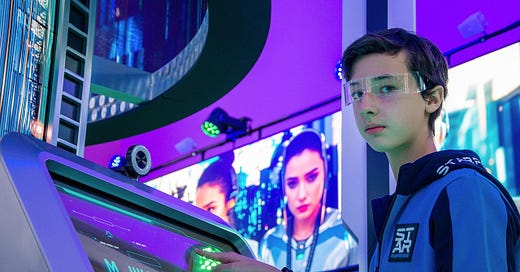Education that Meets the Moment
What is the real educational core for children to thrive in our unpredictable future?
If you prefer to listen to today’s message, just click on the headphones icon above.
Hello Bar-setters,
For better or worse, AI has changed the way students approach education.
Its potential is amazing: offering personalized tutoring, motivating debate options, and the ability to quickly create practice prompts.
But AI also enables students to fabricate massive amounts of work with a few keystrokes. This prompts a larger question: How should the AI revolution reshape what we teach?
A shift of this scale should force us to reconsider what is considered “core” to each citizen’s education. Yet, not enough people are asking the big questions:
What should schools teach when we can’t predict what jobs will exist in thirty years?
What skills will truly matter?
In a world where technology can do most of the work for us, what knowledge and capacities should we expect of all people?
And does the value of education extend beyond mere career preparation?
I’ll explore these questions in more depth in the future.
For now, I wanted to share a related excerpt from my book, Setting the Bar: Preparing Our Kids to Thrive in an Era of Distraction, Dependency, and Entitlement. Though I wrote it before the rise of ChatGPT and other AI models, its insights remain strikingly relevant—offering a lens through which we can rethink education’s purpose in the age of AI.
Enjoy!
Meeting the Moment
Following the signing of the Constitution on September 17, 1787.
“A primary object should be the education of our youth in the science of government. In a republic, what species of knowledge can be equally important? And what duty more pressing than communicating it to those who are to be the future guardians of the liberties of the country.” — George Washington
Stacy is an intelligent and social high-school junior. She plays soccer, works on the student council, and does well on her classwork. This week she learned how to solve equations with two square roots, created a PowerPoint on urban tenement living conditions in late 19th century America, was quizzed on how inertia and friction affect movement, and demonstrated her understanding of short-story elements by writing about the flat tire she got on her way to see Taylor Swift in concert. Her generic coursework is completely unsurprising, at least until you stop to think about the world we are preparing her for.
Stacy’s teachers have never mentioned deep fake technologies and how they will soon allow anyone to take a person’s image and voice recording and make them appear to do and say anything. There has been no class or faculty discussion about the needs of workers in an increasingly automated job force or the instability that is likely to characterize future employment. Stacy’s classes have never mentioned the potential of genome editing to create enhancements in future humans or 3D bioprinters and how they could soon allow an average citizen to print off the next global pandemic. Her teachers don’t seem to know or care about Dr. Nick Bostrom’s Vulnerable Earth Hypothesis or its assertion that a “black ball” technology could be discovered at any time allowing one unskilled madman to wipe out an entire city.
Bostrom warns that some technological discoveries could be catastrophic—what he calls "black ball" technologies. If someone accidentally discovered that you could create a nuclear weapon by something as simple as microwaving sand, civilization could be doomed overnight. The problem is that once such knowledge is out, it cannot be undone.
I don’t really think it matters whether or not we discuss 3D bioprinters and “black ball” technologies. Given the volatility of the world our children will inherit, safe spaces and superficial curriculums may do more harm than good. Perhaps we approach education with too much apathy and naivety. Students who have not mastered basic logic and dialectical principles—who have no sense of how the world works, no grasp of history’s deeper lessons, and no experience discussing uncomfortable ideas—will not have the means to solve complex challenges.
We’ve hardly begun to imagine the challenges future generations will inherit. College has grown nonsensically expensive, the national debt defies comprehension, and our biggest technology companies collect and sell all of our data. They exert super-governmental control while repeatedly demonstrating a disregard for any legal or sovereign power who would try to limit them. Their unchecked influence is only poised to grow.
There is a fundamental disconnect in education where the status quo reigns without any appreciation for the needs of our time or the responsibility of education to adequately prepare youth for a volatile world. Most of us won’t be enlisted in creating specific solutions, but we have to understand the scale of these issues in order to have any sense of proper societal prioritization—to be the type of informed citizen democracy requires. We have to be educating students in a way that gives them the best opportunity to thrive.
Currently, many schools prioritize content coverage over meaningful epistemic development. The future will demand a citizenry capable of making sense of a chaotic world. As technology grows more powerful, it increasingly seems our only options are mass chaos or Orwellian oppression.
Philosopher Daniel Schmachtenberger argues that the only way out is through comprehensive education that fosters three forms of epistemic intelligence:
Third-person epistemics: Scientific reasoning, formal logic, and the ability to accurately interpret base reality. Teach students logical fallacies. Bring back debate and the Socratic Method!
Second-person epistemics: The capacity for empathy and perspective-taking—understanding and steel-manning opposing viewpoints. The foundation of this skill is the next one…
First-person epistemics: Self-awareness of personal biases, groupthink tendencies, and emotional blind spots.
(This transitions to my four-chapter manifesto on what an education that meet the modern moment would look like.)
These three vital skillsets work together as a framework for meaningful sense-making. First-person epistemics give us a base understanding of the human condition—revealing the psychological vulnerabilities and cognitive biases that pull on us all. With this understanding, we recognize the need to hone our sense-making skills (third-person epistemics) and communicate more effectively with others (second-person epistemics).
As we come to see how uniquely challenging our environment is—how brilliant marketers exploit our vulnerabilities and overwhelm us with supernormal temptations—we further recognize the need to develop self-discipline (first-person epistemics) and arm ourselves with a foundational defense against these dark arts (third-person epistemics).
Despite our neglect of them, these are the most vital skills for all citizens in the modern environment. And AI is only making them more essential.
Unfortunately, not enough schools teach third-person epistemics well, and even fewer prioritize first- and second-person epistemics. Amid rising mental health crises, drug overdoses, suicides, and mass shootings, we must equip people with a deeper toolkit.
As Schmachtenberger explains:
“We need a new cultural enlightenment where everyone values good sense-making about themselves, others, and base reality. Only through quality dialogue and collective intelligence can we hope to navigate the future. It’s cultural enlightenment or bust.”
Here’s to a cultural enlightenment—because without one, we’ll remain at the mercy of the forces we fail to understand and which grow more powerful by the day.
Thank you for reading and sharing with any kindred spirits!
If you want more like this, check these out:
Carry the fire!
Shane







